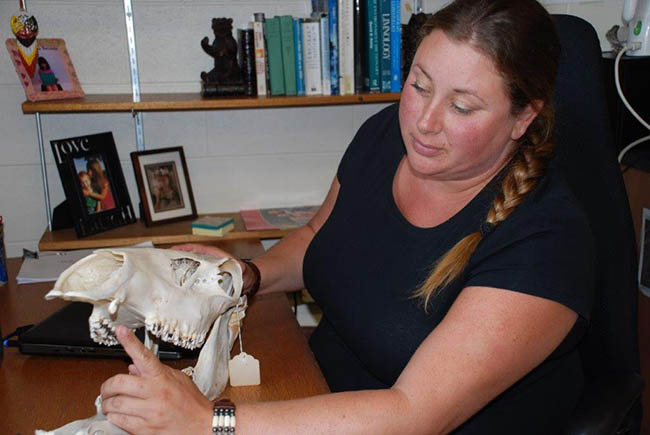‘Somebody should do something about that’

Biologist encourages more Indigenous students to pursue science
By Laura E. Young
SUDBURY – Laurentian University’s first-ever Indigenous PhD graduate in biology not only wants more First Nations students to choose the sciences, she’s doing something about it.
In May, Jesse Popp became the university’s first Indigenous student to earn a biology doctorate, according to Laurentian.
Throughout her biology career so far, she found it rare to see Native perspectives or content in biology.
As part of the solution to that issue, Popp created and now teaches Indigenous peoples ecology, science and technology at Laurentian. This third-year biology elective is open to students in the arts, as well as the sciences, she says.
“I’m very passionate about wildlife ecology and incorporating Indigenous culture and knowledge. If I can help make that happen by being a role model (and) by encouraging people to help with this cause, that’s what I want to do. It’s not just me who’s going to change the world; it’s many people.”
Throughout her undergraduate degree, she noticed a lack of Indengous content and students. She sought to change that by offereing her third year course. She says the university is doing a great job at changing the amount of Indigenous content.
She seeks to find more ways to collaborate more with the university, incorporating Indigenous approaches with those found in the western sciences.
She feels honoured to be considered a role model, as a woman in the sciences and as an Indigenous woman. She reflects on a quote from American actress Lily Tomlin that essentially says: “’I always wondered why somebody didn’t do something about that. Then I realized I was somebody.’”
Popp believes in the ongoing encouragement of Indigenous people at the university, and would like to serve as a sounding board for prospective or current students, she says.
Popp, a member of Wikwemikong Unceded Indian Reserve, received her PhD in boreal ecology for her work centred on the population dynamics of reintroduced elk in eastern North America.
Popp’s passion for biology began when she was a small child. She would accompany her mother into the bush where they discussed, observed and collect plants. “She would dry them all over the house. I loved going out with her. I learned so much about plants (that) I always wondered about the other side, all the wildlife.”
She rarely saw them so she became intrigued. Her career path was cemented after she watched a television program about the work of a biologist. “Since I was very young I knew I wanted to be a biologist and contribute to conservation and preservation of the environment.”
She’s always been drawn to large mammals. After she completed her masters’ degree, she wanted more hands-on experience. She connected with Josef Hamr, a retired wildlife biologist, formerly based at Cambrian College, who worked with large mammals, including elk.
He placed her out in the field radio tracking elk at the Burwash site south of Sudbury, a home of one of four re-introduced elk populations in Ontario.
“Ideally you want to prevent extinctions of species. But if they’re recently gone, the thought that you can help restore them, I was intrigued by it.”
No one had really looked at reintroduction success, she adds. “Plus you fall in love with the animals when you’re out there tracking them.” Elk are regal, almost like ghosts as they were once here and have since disappeared, she says.
The real world life as a biologist is better. “Everything is amazing to me, it’s living the dream, my dream, for sure,” she says.
Still, it’s a crowded dream: among her many projects, Popp is working on a moose research program with Anishinabek Nation communities to monitor moose in their traditional territories. She works with the Sudbury District Fish and Wildlife Advisory Group, and the Sudbury Elk Restoration Committee.
Popp, a mother of two, also earned her master’s and undergraduate degrees in science from Laurentian.
LINKS: https://www.researchgate.net/profile/Jesse_Popp
http://www.thesudburystar.com/2015/08/08/sudbury-accent-new-cubs-on-the-block
Editor’s Note: What’s in a role model? Who is a role model? Is it a cliché? Is it patronizing or do so-called role model stories become necessary to balance the tide of negative stories? In this ongoing series, Ontario’s Indigenous women reflect on that term role model when they have a moment between their work serving in education, health, justice, and social work.


